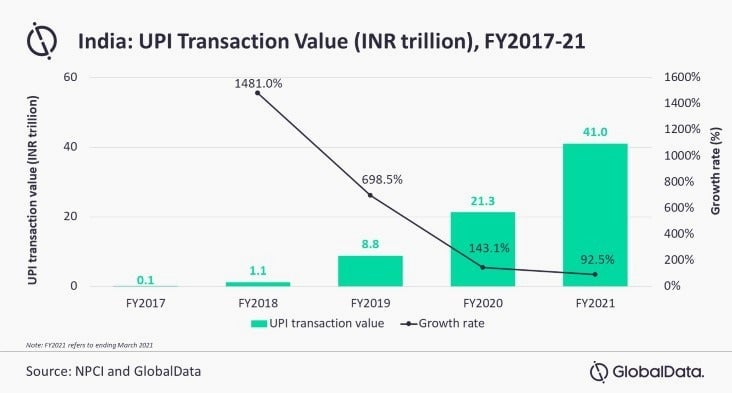Why Facebook, Google, and Amazon want to build online payments platforms for India
Some of the largest companies in the world are teaming up with local conglomerates to get a share of India’s fast-growing online payments ecosystem.


Some of the largest companies in the world are teaming up with local conglomerates to get a share of India’s fast-growing online payments ecosystem.
Four consortiums have submitted applications for the National Umbrella Entity (NUE) licenses, which will allow firms to build a real-time payment platform for India. These consortiums include companies such as Silicon Valley giants Facebook and Google, and India’s largest businesses like Reliance Industries, Tata Group, HDFC Bank, and ICICI Bank.
The Reserve Bank of India had invited applications for NUE licenses in August 2020. The new platforms will work as alternatives to the country’s only instant digital retail payment network, the United Payments Interface (UPI).
UPI attracting Google, Facebook, and Amazon
Building a payment platform for Indians has caught the attention of these giants mainly because of the success that UPI has tasted since its inception in April 2016.
UPI, which is owned by a group of Indian banks, is a payment mode that can be used for most online transactions in India ranging from paying for groceries to applying for shares in an IPO. Its convenience has led to the value of transactions done via UPI go from Rs69.5 billion ($952 million) in the financial year 2017 to Rs41 trillion in the financial year 2021.
This growth has been fueled by factors such as penetration of smartphones, cheap internet data, and the Narendra Modi government’s focus on creating a cashless economy. The demonitisation of Rs500 and Rs1,000 notes in 2016 had given a massive push to online payments, which got a further boost with the spread of Covid-19.

Several global companies have already benefitted from the popularity of UPI by building payment apps that facilitate transactions via UPI. For instance, in September 2017 Google launched the Google Pay app, in May 2018 Walmart acquired PhonePay, and Facebook’s WhatsApp entered into digital payments space in February 2018.
Currently, there are 200 banks and fintech firms on the UPI platform.
However, with this growth, the load on the UPI system has increased, and its efficiency has taken a hit. Among other things, UPI has been witnessing higher reversal or failure of transactions. “With rising digital payments, granting NUE license to private players will ease payment settlement burden on UPI and stimulate competition,” said Shivani Gupta, senior analyst-banking and payments at the data analytics and consulting firm GlobalData.
The case for National Umbrella Entity (NUE) licenses
Also, currently, each fintech player is restricted to have only up to 30% of the market share on the UPI platform. If a company crosses that threshold for three consecutive months, it is not allowed to add new users, according to the guidelines (pdf) of the National Payment Corporation of India, the promoter of UPI.
The guidelines have been put in place to discourage monopolisation of the UPI platform, but it also restricts the growth of companies, especially the likes of PhonePe and Google Pay, which are dominating the space.
While global tech giants aren’t able to fully achieve their potential on UPI, experts believe big players like Jio and Amazon, which have a large retail business, would benefit from a separate network. “Players like Jio, Amazon who are already in e-commerce would require their unique digital payment system,” said Arushi Chawla, research analyst at Counterpoint Research.
The forming of a new network will also be more profitable than merely being a part of UPI. “The players will be allowed to charge fees for online transactions. This growing opportunity will also act as a guiding light for the foreign players along with domestic players,” Chawla said.